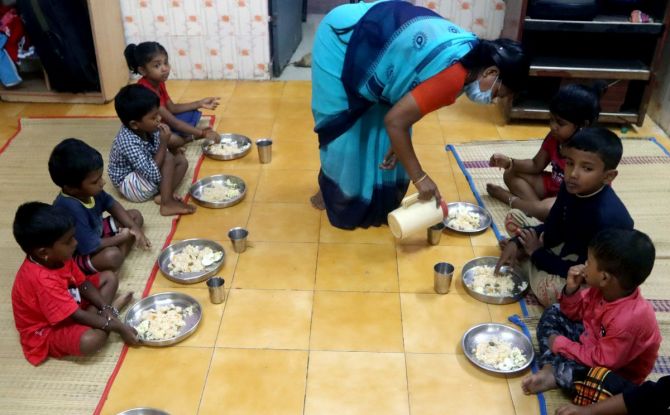The national mid-day meal scheme in government and aided schools will now be known as PM POSHAN Scheme and will also cover students of balvatikas or pre primary classes, the government announced Wednesday.

Encouraging 'Tithi Bhojan' to allow people from community to provide special food to children on occasions and festivals, using harvest from 'school nutrition gardens' for cooking mid-day meals, cooking competitions to promote ethnic cuisine and innovative menus and involvement of Farmers Producer Organisations (FPO) and Women Self Help Groups in implementation of the scheme, are among the features which have been added in the new scheme.
The Union cabinet on Wednesday approved the roll-out of the 'PM POSHAN in Schools' scheme that will provide hot cooked meal to students of elementary classes in government and government-aided schools across the country.
The decision was taken at a meeting of the Cabinet Committee on Economic Affairs (CCEA) chaired by Prime Minister Narendra Modi.
'Today the CCEA cleared the PM POSHAN (POshan SHakti Nirman) Scheme for providing one hot cooked meal in government and government-aided schools from 2021-22 to 2025-26, earlier known as 'National Programme for Mid-Day Meal in Schools popularly known as Mid-Day Meal Scheme.
'This is a centrally-sponsored scheme which covers all school children studying in classes 1 to 8 in government, government-aided schools,' Union Education Minister Dharmendra Pradhan told reporters.
'Under the new scheme, mid-day meals have been extended to students studying in pre-primary or Balvatikas in addition to children studying in class 1 to 8 in government and government-aided schools across India.
'This will benefit about 11.80 crore children studying in 11.20 lakh schools,' he added.
The CCEA has approved the continuation of the national scheme of PM POSHAN in schools for the five-year period 2021-22 to 2025-26 with the financial outlay of 2 54061.73 crores from the central government and 31733.17 crore from state governments and union territory administrations.
'Central government will also bear additional cost of about Rs 45,000 crore on food grains. Therefore, the total scheme budget will amount to 130794.90 crore. The concept of Tithi Bhojan will be encouraged extensively. Tithi Bhojan is a community participation programme in which people provide special food to children on special occasions and festivals.
'Government is also promoting development of 'School Nutrition Gardens' in schools to give children first-hand experience with nature and gardening. The harvest of these gardens is used in the scheme providing additional micro nutrients. School Nutrition Gardens have already been developed in more than 3 lakh schools,' he said.
While social audit of the scheme is made mandatory in all the districts, special provision is made for providing supplementary nutrition items to children in aspirational districts and districts with high prevalence of Anemia.
'Cooking competitions will be encouraged at all levels right from village level to national level to promote ethnic cuisine and innovative menus based on locally available ingredients and vegetables.
'Involvement of Farmers Producer Organizations (FPO) and Women Self Help Groups in implementation of the scheme will be encouraged. Use of locally grown traditional food items for a fillip to local economic growth will be encouraged,' Pradhan said.
'Field visits for progress monitoring and inspections will be facilitated for students of eminent universities and institutions and also trainee teachers of Regional Institutes of Educations (RIE) and District Institutes of Education and Training (DIET).'
The mid-day meal scheme was launched in 1995 with an aim to provide at least one nutritional meal to elementary students.
It had later become instrumental in improving enrollments in schools.
Explaining the structural changes in the scheme, Pradhan said that the Centre has directed the states and the UTs to switch to Direct Benefit Transfer (DBT) system for providing honorarium to the cooks and helpers working under the scheme.
'The government has made some structural changes to ensure transparency. Earlier, there were instances of leakages (of money)... In the coming years, the Centre might directly transfer funds to the schools according to their requirements,' he said.
Earlier, the central government would allocate the funds to the states which include their share and transfer them to the mid-day meal nodal officers at the district or tehsil level.
The officers then transfer them to the schools.
A senior Ministry official said that under the new scheme, if states want to include their local vegetable or any other nutritional food or anything else such as milk or fruit, they can do so with the centre's approval.
'However, it should fall within the allocated budget. Earlier, states had to bear the cost if they include any extra item,' the official said.
The government did not announce anything on the provision for adding breakfast in the mid-day meals which was outlined in the new National Education Policy (NEP) notified last year.









